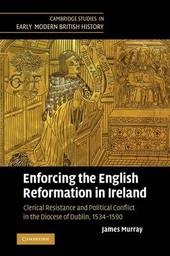
|
Enforcing the English Reformation in Ireland: Clerical Resistance and Political Conflict in the Diocese of Dublin, 1534-1590
Paperback / softback
Main Details
| Title |
Enforcing the English Reformation in Ireland: Clerical Resistance and Political Conflict in the Diocese of Dublin, 1534-1590
|
| Authors and Contributors |
By (author) James Murray
|
| Series | Cambridge Studies in Early Modern British History |
|---|
| Physical Properties |
| Format:Paperback / softback | | Pages:376 | | Dimensions(mm): Height 229,Width 152 |
|
| Category/Genre | British and Irish History
History of religion
Christianity |
|---|
| ISBN/Barcode |
9780521369947
|
| Classifications | Dewey:274.1506 |
|---|
| Audience | | Professional & Vocational | |
|---|
| Illustrations |
Worked examples or Exercises
|
|
Publishing Details |
| Publisher |
Cambridge University Press
|
| Imprint |
Cambridge University Press
|
| Publication Date |
21 July 2011 |
| Publication Country |
United Kingdom
|
Description
This book explores the enforcement of the English Reformation in the heartland of English Ireland during the sixteenth century. Focusing on the diocese of Dublin - the central ecclesiastical unit of the Pale - James Murray explains why the various initiatives undertaken by the reforming archbishops of Dublin, and several of the Tudor viceroys, to secure the allegiance of the indigenous community to the established Church ultimately failed. Led by its clergy, the Pale's loyal colonial community ultimately rejected the Reformation and Protestantism because it perceived them to be irreconcilable with its own traditional English culture and medieval Catholic identity. Dr Murray identifies the Marian period, and the opening decade of Elizabeth I's reign, as the crucial times during which this attachment to survivalist Catholicism solidified, and became a sufficiently powerful ideological force to stand against the theological and liturgical innovations advanced by the Protestant reformers.
ReviewsReview of the hardback: '... Murray's work ... provides a modern analysis of the physical makeup of the Tudor diocese of Dublin and also illuminates the careers of the individuals who headed that diocese following Henry VIII's split with Rome. Furthermore it supplies one of the most succinct accounts yet written of how the religious changes enacted by the Tudors impacted upon the wider public life of Dublin and the Irish kingdom. As such it makes an important advance in our understanding of many aspects of the Tudor Reformations in Ireland and contributes significantly to the debate thereon.' David Heffernan, Oenach '... this much anticipated volume has a great deal that is new and important to say on the subject [of why the Reformation failed in Ireland] ... the author's fresh perspective on an old problem marks this as a Reformation study of high quality.' Irish Economic and Social History
|